…on the Subject of Waste Can Liners
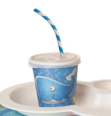
A good friend, a retired Episcopal priest, is one of the more environmentally conscious people I happen to know who’s not in the biz.
He and his charming wife recycle their used paper shopping bags as kitchen waste can liners. But- “We would really like to use reusable bags for groceries and stop bringing home the paper sacks,” he explained in a recent email. “Is there a biodegradable and so disposable bag for sale which we can use?”
Not the first question on the subject. The Seattle Public Utilities office offers guidance by manufacturer name. Among ‘em is Natur-Bag which offers a range of product sizes, including for the common Tall kitchen waste can.
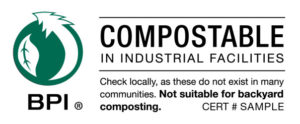 Question for readers? Does your municipality’s PWD offer something along the very same lines? If not, why not contact? Claim yourself a wide-eyed environmentalist who’s wondering which waste can liners are truly compostable, and why such knowledge can’t be offered online as a guide for tax-paying consumers trying to do the right thing.
Question for readers? Does your municipality’s PWD offer something along the very same lines? If not, why not contact? Claim yourself a wide-eyed environmentalist who’s wondering which waste can liners are truly compostable, and why such knowledge can’t be offered online as a guide for tax-paying consumers trying to do the right thing.
If the claimed compostable waste liner is made from plant starches (such as corn, wheat or rice), vegetable oils or compostable polymers, chances are good the claim is valid. Also, if the packaging shows the BPI symbol, your assurance is greater.
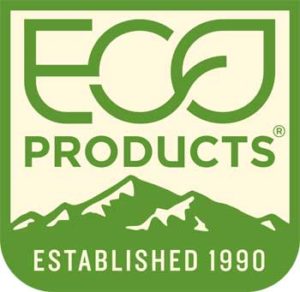 Another manufacturer, called Eco Products, offers a list of categories of its biodegradable products, such as paper and wheat straw containers, compostable straws and black unwrapped cocktail straws. (Are you recalling my post about what harm non-biodegradable straws can do? If not, see here.)
Another manufacturer, called Eco Products, offers a list of categories of its biodegradable products, such as paper and wheat straw containers, compostable straws and black unwrapped cocktail straws. (Are you recalling my post about what harm non-biodegradable straws can do? If not, see here.)
Eco Products’ 13 Gallon Compostable Can Liner looks like a perfectly suitable product, available through amazon.
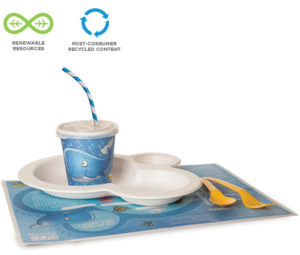 And, it actually has a line of biodegradable products suitable for…your kids, including their birthday parties? The line is called Eco-Products® Kids. Items are adorned by Starfish, Dolphin and Wendell the Whale. From its website: “…this sea-themed suite…boasts the same environmental benefits as our stuff for grown-ups.”
And, it actually has a line of biodegradable products suitable for…your kids, including their birthday parties? The line is called Eco-Products® Kids. Items are adorned by Starfish, Dolphin and Wendell the Whale. From its website: “…this sea-themed suite…boasts the same environmental benefits as our stuff for grown-ups.”
Here’s another biodegradable fitting the Medium garbage can we use under-sink. It’s called ECOSAFE 6400 7 gal. Biodegradable Trash Bags.
If it seems that I’m calling out Eco Products, I am. It offers for examination the so-called EcoProduct i-report, a products footprint report from 2013. From the exhaustive report are the following footprint categories/subcategories:
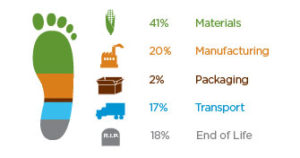
- Materials and transport of materials.
- Manufacturing and transport inside manufacturing.
- Packaging- The packaging life cycle step includes the production of the packaging materials as well as their transport.
- Transport to warehouse and transport to customer and to end-of-life.
- End-of-life- The end-of-life life cycle step includes the disposal of the product in a landfill or incineration plant, according to US averages by material.
Eco Products overall manufacturing impact assessment looks just like the footprint pictograph shown here. Committed it is. Authentic. Way cool.
You know there’s a difference between biodegradable and compostable? Essentially, both refer to materials that can break down and decompose into natural elements within a short time. If claiming biodegradable, the term implies the materials typically break down within a year of disposal. Also implied is the materials suitably break down in landfills.
And, as you’ve learned from your child/grandchild whose elementary school features composting as one of its STEM undertakings, compostable means that the materials broken down do actually replenish the earth. BTW, do you compost your kitchen waste?
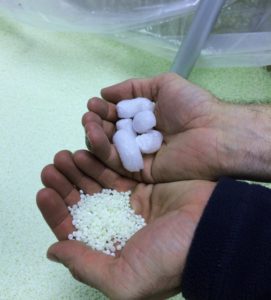
Have you heard that compostable packaging materials include starch-based packing peanuts? An alternative to Styrofoam packing peanuts, these can be dissolved in water (a kind of soup?) and added to composts for safe disposal. Fun weekend project for the kids/grandkids, eh? The image and its associated product comes from Frontier Natural Products Co-op, based in Norway, Iowa.
But, beware of green-scammers. These are businesses that call their products biodegradable and get away with as the term can be stretched mightily. Those product manufacturers could be basing their claims on the fact that the product may simply break down, eventually, into smaller and smaller pieces of plastic. So warns a group called Ocean Friendly Restaurants, Hawaii.
♠
Glad to hear it: In today’s Washington Post is a piece reporting on a meeting yesterday between Pres. Obama and India’s Prime Minister Narendra Modi. Speaking about the Paris climate accord, environment reporter Steve Mufson writes: “Even without the agreed deadlines [to ratify the accord], the recent pledge by presumptive Republican Presidential nominee Donald Trump to renegotiate the Paris climate accord if he is elected has added a sense of urgency among world leaders to make sure the pact goes into effect before the end of the year.”